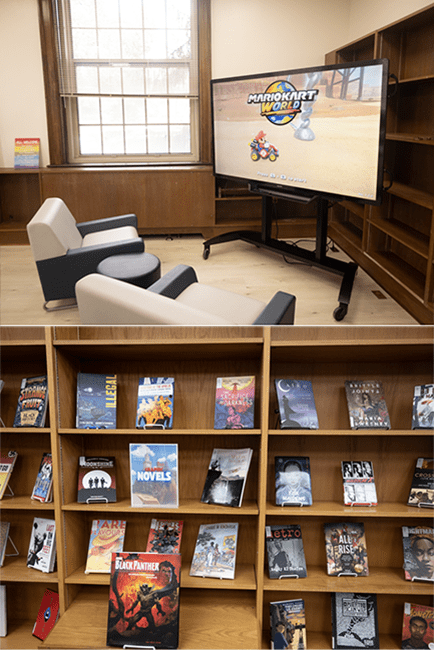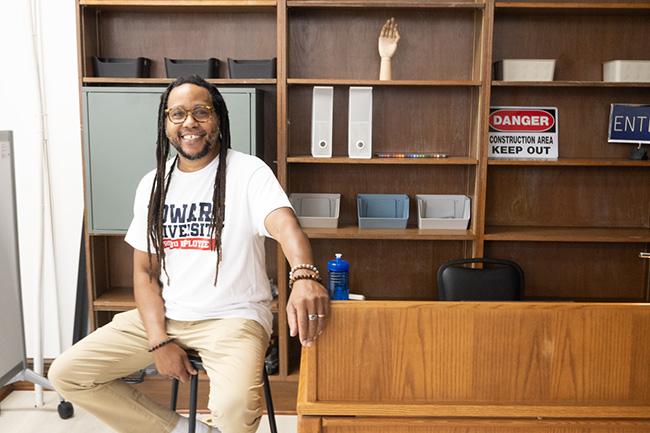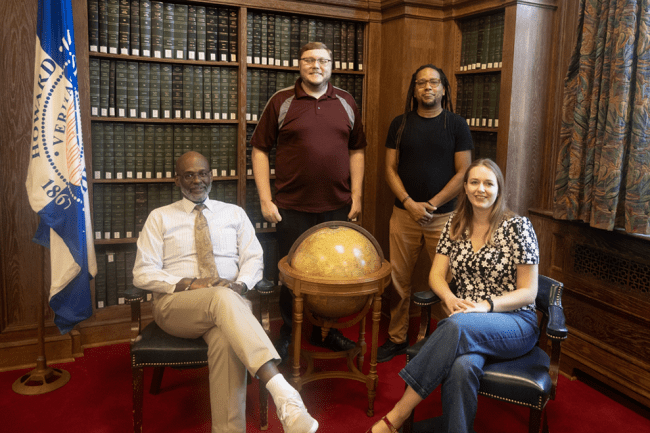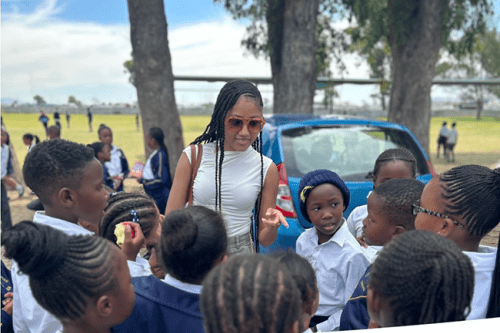Only two days into its reopening, Founders Library is buzzing with activity. Benjamin Talton, Ph.D., Moorland-Spingarn Research Center executive director, leads the newest group of students joining the center for work-study, while in the new Innovation Hub, Chris Harper welcomes students as they stream in and out to check out the new 3D printers, high-powered AI computers, and gaming space. Upstairs, students browse the newly added graphic novels collection.
Within the Browsing Room, our interview with Events Manager Errol Watkis is interrupted when he gives an impromptu tour, sharing just some of the history of the room with a visiting group of international leaders from across Africa as part of the U.S. Department of State’s International Visitor Leadership Program. He shows them the globe of Ralph Bunche — first Black Nobel Peace Prize winner, instrumental U.N. architect, decolonization leader, and founder of the Howard Department of Political Science — as well as the university’s expansive collection of 1800s British parliamentary papers, calling on one of the visitors to read the spines on one shelf, all on the Atlantic slave trade.
“Every other day or so,” Watkis said, laughing, when asked how often these impromptu tours happen, just as another group approaches the door. The stream of people in and out reflects the excitement of students, faculty, and community members to return to this cornerstone of Howard.
Embodying Truth and Service
Equally excited are the staff, who are eager not only to work within the library itself again, but more importantly, to work directly with students after 18 long months.
“Honestly the first time I walked in, I immediately got chills,” said Teaching, Learning, and Engagement Librarian Danica White, who joined Founders while it was still closed to the public. “I know it’s such a historical place but being inside is a whole different level. Also, just being engagement librarian working with students — I’ve worked at other R1 institutions, and these are truly the best students I’ve ever worked with.”
“For me, the most exciting thing when I started last year was hearing all the big names, like ‘Oh Toni Morrison used to come to this building. Kamala Harris has been to this building,’ and it’s just really exciting to be around that history every day,” said Katharine Elkes, economics and patent trademark librarian. “But I think the students are my favorite part of my job. I’m so excited that they’re going to be back in the library in person. Already this is so exciting and has this back-to-school feel.”

Now fully operational, the library offers extensive services — including many students and faculty may not know about. Throughout the year, for example, staff run events and courses on everything from database navigation to zine production. Also available are the many subject matter liaisons, who work closely with departments and colleges across campus to support everything from finding research materials to applying for grants and publishing.
An indispensable research resource
Despite its long history, Founders remains a fully modern library, as demonstrated by the Innovation Hub. This newest addition, designed to be part maker-space, part data center, and part “AI sandbox” — brings cutting-edge 3D printing, two high-power computers, and advanced AI software to the entire student body, with plans to expand including an additional two computers.
“We want this space to be for all students, not just students necessarily studying in the school of architecture or in engineering or science, where they have these resources,” explained Harper. In addition to being a space for students to freely explore these new technologies — or even just play Mario Kart on the Switch 2, also set up in the hub — he encourages professors to make use of the space to improve their own classes. “Definitely students can come in by themselves, but it would be great to get some classes integrated with us, that have some sort of 3D project or that want to use software the students don’t have.”

For Executive Director Delritta Hornbuckle, the Innovation Hub is a long-overdue addition, and one of several ways the library continues to be essential to Howard’s status as a cutting-edge scientific leader.
“We want to make sure that faculty understand that we're here to be a part of that research engine, and this is what we do, and you know what, we have specific librarians trained in very specific areas,” she said while explaining just how vital the library is to Howard as an R1 institution. Along with the Innovation Hub and helping researchers navigate massive datasets across all fields, Hornbuckle has been leading an effort to establish an institutional repository, a collection of all work published by Howard faculty. “I’ve been on a crusade, to be honest with you, around these things.”
Embracing Legacy and Evolution
While Founders continues to evolve along with the rest of the university, it remains a monumental center for the preservation of Black history, housing one of the largest collections of books, documents, and artifacts of the African American diaspora in the world. As Moorland-Spingarn’s chief librarian, Christina Vortia is one of many stewards of these critical pieces of history and is still struck by the dedication of those who helped preserve them. “What stands out about the collection is how important it was to these historical figures,” she said. “Many of them gave everything. Some of them gave their remains. Some of them gave their family papers, their papers, their personal books, their personal effects, because they believed so deeply this library and this archive needed to happen.”
Today, the effect of the collection is difficult to overstate. “There was a couple that came and wanted to donate their collections to the center, and I showed them this, and the wife started to cry,” she said, pulling out a first edition of “The Interesting Narrative of the Life of Olaudah Equiano, Or Gustavus Vassa, The African,” considered the first memoir on the Transatlantic slave trade written by a person of African descent. “In here, he writes this letter in 1792 about the wedding of his daughter.” These tangible connections to the past continue to impact students and guests to this day. “There’s this long line where, when you talk to people, they trace the origin of their family, of their intellectual pursuits, of their scholarship, directly back here to Howard. It’s fascinating and something you can really get lost in.”

That legacy as a center for scholarship remains, even as students today use new tools.
“As a library we need get in front of everybody, so to speak, and remind them that we are the one stop shop for the resources, and more than anything discovery,” said Hornbuckle. “When you come into the library, we’re still the place of discovery. Whether it’s digital, whether it’s online, whether it’s doing the things the old-fashioned way and going up into the stacks — look to the right of you, look to the left — what do you discover?”





